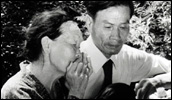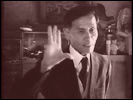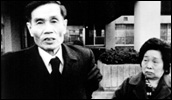The Emperor’s Naked Army Marches On
- Year
- 1987
- Original title
- Yukiyukite Shingun
- Japanese title
- ゆきゆきて、神軍
- Director
- Cast
- Running time
- 122 minutes
- Published
- 21 October 2007



by Lindsay Nelson
Early on in Kazuo Hara's The Emperor's Naked Army Marches On, the protagonist, 62-year-old Pacific War veteran Kenzo Okuzaki, begins what appears to be a typical Japanese wedding speech. As the camera moves between the traditionally dressed bride and groom, their eyes downcast, the speaker lists the groom's university and place of work, then congratulates the couple on their union. And then, with the matter-of-factness that will become his defining characteristic in the film, Okuzaki mentions that he fired Pachinko balls at Emperor Hirohito, killed a real estate broker, and served more than thirteen years in prison. The groom also "fought against the establishment", and that's how the match was made. No one reacts adversely, and the next shot is of the groom singing, followed more speeches and shouts of "Banzai!" We have entered a world of outsiders, one where Japanese traditions still command respect, but where certain societal norms are clearly being ignored.
Director Kazuo Hara has made a career out of documenting the lives of those living outside Japan's notoriously conformist society. His Goodbye CP (Sayonara CP, 1972) dealt openly with cerebral palsy, while Extreme Private Eros: Love Song 1974 (Kyokushiteki Erosu Koiuta 1974, 1974) followed the exploits of his ex-lover, radical feminist Miyuki Takeda, as well as Hara's own relationship with his producer, who eventually became his wife. With The Emperor's Naked Army Marches On, Hara focuses on Pacific War veteran and anti-Emperor activist Okuzaki seeking explanations for the deaths of soldiers in his regiment that occurred after the war had officially ended. Okuzaki suspects that they were cannibalized, or killed by superior officers because of the cannibalism they had witnessed. The camera follows him as he seeks out former army officials and relatives of the deceased, frequently resorting to verbal and physical abuse in order to get answers from his less-than-forthcoming targets. Conclusive answers are never provided, but several former officers essentially admit to cannibalism, and to killing soldiers to cover up what they did.
The film is basically a series of very long conversations punctuated by Okuzaki's occasional eruptions of violence. The anguish of both the deceased's relatives and the perpetrators is palpable-the relatives want the truth, but the superior officers have become so accustomed to lying that they may no longer be able to distinguish truth from falsehood. Cannibalism is talked about in the same matter-of-fact tone as Okuzaki's violence; we learn that human meat was referred to as "pork" and that natives of New Guinea were referred to as "black pigs," while Allied soldiers were referred to as "white pigs." Okuzaki, one minute bowing and presenting a business card and the next wrestling older men to the ground, emerges as a man full of contradictions. He rails against the establishment for lying about wartime atrocities, but deceives his targets by having his wife and friend pose as relatives of deceased soldiers. He condemns the deaths of the soldiers but has no problem engaging in violence of his own. His violence is inexcusable, but it is also effective-superior officers who claim amnesia suddenly regain their memories when Okuzaki threatens to beat them up. He's far from admirable (or even likeable), but you find yourself wanting him to succeed in his quest for the truth.
Made in 1987, Emperor can be seen as a precursor to current trends in Japanese documentary cinema, which emphasizes a Spartan, no-frills camera style and low production costs. Like Tatsuya Mori's A and A2 and Yutaka Tsuchiya's The New God, Emperor is cheaply made, relying mostly on handheld camera footage. Clean, carefully-composed camera angles are dispensed with (the camera equipment and microphones frequently pop up in the frame). The tiny, cluttered spaces of Japanese homes and offices appear even bleaker in the absence of artistic lighting or framing. With little in the way of background music and a somewhat haphazard editing style, the audience is left with only the characters to focus on, which is exactly what Hara wants.
Hara's films frequently call into question the relationship between filmmaker, subject, and audience. Watching films such as Eros and Emperor, the viewer occasionally feels like a guilty participant in the events taking place on screen. In one agonizing scene in Eros, Hara films the birth of his own son in a house in Tokyo, with no doctors present. The baby is delivered unconscious, and for several minutes its limp body is washed, patted, and shaken upside down until finally, to the audience's intense relief, the infant begins to cry. In Emperor, Hara watches as Okuzaki kicks and attempts to strangle an elderly ex-army officer who has just had surgery, leading the victim to scream, "You just film it and do nothing?" Later, we learn that Okuzaki attempted to kill one official's son, which seemed to thankfully cause Hara to draw a line-the attempt was not filmed. The passive audience member watching such events becomes, inadvertently, a participant, while the ostensibly objective filmmaker could be accused of gross negligence.
The film also provokes plenty of laughter, though it's usually of the uncomfortable sort. When the relatives of the deceased soldiers decide that they no longer wish to accompany Okuzaki on his quest, Okuzaki doesn't give up. The scene in a pub where he calmly tells his wife and friend that they will "play" the roles of the relatives is priceless, as are subsequent scenes where the wife and friend sit mutely as Okuzaki tells army officers how much they have suffered. The bizarre way in which violence is threatened (Okuzaki politely tells one former officer that he came here planning to beat him up, but decided not to), as well as the bland way in which the potential victims respond, makes an uncomfortable situation unintentionally humorous. Even when violence happens, the ludicrousness of the situation (family members standing by politely saying, "No violence," Okuzaki offering to call the police himself, the inaction of the police when they do arrive) makes for funny, if still uncomfortable, scenes.
In the end, though, what we are seeing is essentially "real", which makes for uneasy viewing. By filming Okuzaki's violence and not intervening, does Hara condone his actions? Subsequently, does the watching audience also condone both Okuzaki and Hara's actions? At one point should the filmmaker cease to be objective and step in to influence the events he or she is filming, if ever?
In a 1993 interview with Dartmouth professor Jeffrey Ruoff, Kazuo Hara was quoted as saying that documentaries "should explore the things that people don't want explored." His own documentaries have become famous doing just that, and for displaying images that the public doesn't necessarily want to see. Though his inaction in the face of the violence and potential suffering that happens in front of his camera raises serious ethical questions, The Emperor's Naked Army Marches On should be applauded for its sheer audacity, and for the important questions it raises about the roles and responsibilities of filmmaker, audience, and subject.